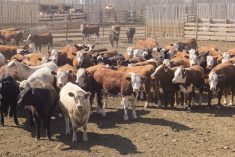Canada will put forward a list of U.S. products it wants to target in retaliation for U.S. country-of-origin meat labels if last-minute changes to U.S. label regulations don’t prove satisfactory, Canadian officials said on Friday.
The dispute stems from a 2009 U.S. requirement that retail outlets put the country of origin on labels on meat and other products, a move the government said was in an effort to give U.S. consumers more information about their food.
Canada and Mexico complained that the mandatory country-of-origin labeling (COOL) rule caused a decline in U.S. imports of their cattle and pigs, and the World Trade Organization has ordered the United States to make changes by May 23.
Read Also

U.S. livestock: Feeder cattle hit contract highs on tight supply
Chicago | Reuters – All Chicago Mercantile Exchange feeder cattle futures and most live cattle futures hit contract highs on…
“We will be putting forward a list of retaliatory products to make sure that the Americans have a further understanding of what that will be,” Canada’s Agriculture Minister Gerry Ritz said at an unrelated news conference in Saskatoon.
“The process requires that it goes back to the WTO for a ruling on whether or not their changes are acceptable. Should they not be, then those retaliatory measures are assessed and put into play, and that process can take some months if not a year.”
A spokesman for the minister, Jeffrey English, said later that Canada will not submit any list to the WTO until it sees what changes the U.S. government proposes.
Canada, he said, still hopes the U.S. will comply with the WTO by May 23, but is planning its next steps in case it does not.
Ritz did not say what products Canada will seek to target, but last month he said he expects to go beyond targeting only U.S. beef and pork.
Carol Guthrie, spokeswoman for the U.S. Trade Representative, said the United States intends to comply by May 23, and therefore no retaliation should be authorized.
Canada is also aiming to build consumer confidence about the food it produces after a major recall of tainted beef last year from an Alberta packing plant.
Ritz announced a plan on Friday that he said would result in better food inspection in Canada, including improved controls on E.coli bacteria in beef plants.
— Rod Nickel is a Reuters correspondent based in Winnipeg. Additional reporting for Reuters by Doug Palmer in Washington.
Related story:
COOL changes expected to worsen financial damage, April 12, 2013















